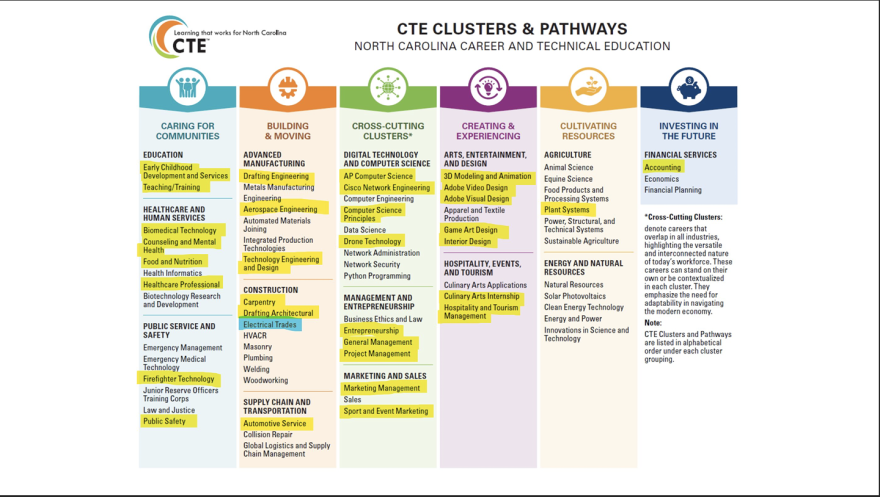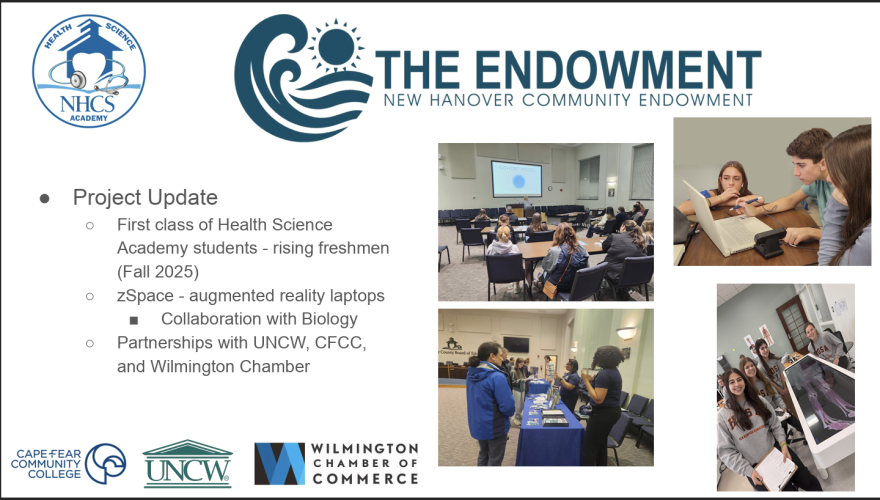The banned book in question is Stamped: Racism, Antiracism, and You by Jason Reynolds, based on the work of Ibram X. Kendi. The book for young adults addresses the history of racism in America.
“Stamped” was initially the subject of a temporary ban in New Hanover County, but it’s been about 18 months since that decision, with no update.
During the board meeting, Democratic school board member Judy Justice motioned to discuss the book’s status — but after a two-to-five vote on party lines, the board moved on.
Dr. Tim Merrick, a fellow Democrat on the board, pointed out that under the school board’s policy, only two votes are needed to have an item added to the agenda; Justice questioned why the board isn’t following their own policy.
Their objection is procedural since the board’s five Republican members could easily vote down any actual action suggested by the two Democrats. They could also vote to override their own policy — for example, the one requiring an item to be put on the agenda if it's supported by two board members. But, as Merrick has pointed out, they haven’t actually done that. The issue, while technical, appears particularly pointed for Merrick, given he was just censured by the board for his own policy violations.
Career and Tech
Mandy Mills the director of Career and Technical Education for New Hanover County Schools gave an update on CTE pathways, a program designed to help high school students earn nationally recognized certifications in special occupational areas such as carpentry. The program is also intended to increase a student’s chances of graduating.
Mills presented data showing an increase in CTE Pathway participation from previous school years. While the data shown for the 2023-24 school year has not officially been released from the North Carolina Department of Public Instruction, Mills used the schools’ enrollment files from last year to estimate.
The data showed significant increases in CTE enrollment in both high school and middle school students. The number of middle school participants rose from about 4,000 participants from 2022 to 2023, to just under 6,000 in the 23-24 school year. High school participants increased from about 5,000 in 2022-23 to over 6,000 in 2023-24.
The number of CTE concentrators — those are students who completed their pathway — increased to almost 1,250 in the 2022-23 school year, a noticeable jump from the previous year.
The graduation rates for CTE concentrators remained higher than the district’s overall graduation rates for four consecutive school years, and the number of concentrators graduating with industry credentials remained above 60% between the 2022-23 school year and the 2023-24 school year.
Mills noted that, “one of the key benefits of CTE, both here and across the country, is that students who complete a CTE pathway are more likely to graduate. So it's just a powerful testament to the impact that CTE has.”
Mills also gave an overview of the state’s new cluster model.
One of the biggest changes to the CTE structure, Mills said, is how they are organized. Now there are overarching categories like caring for communities and Investing in the Future, which break down into specific career clusters and are further narrowed down into career pathways.
“This new structure is designed to make it easier for students to see clear connections between their coursework and real world careers. It also helps schools align programs more closely with workforce development and post secondary opportunities,” Mills said.
The pathways highlighted in yellow are offered within the district and pathways highlighted in blue are offered through a partnership with Cape Fear Community College.

Mills also gave an update on the nursing pipeline project, which was funded by the New Hanover Community Endowment.
The New Hanover County Healthcare Career Partnership is a collaboration between NHCS, CFCC, the University of North Carolina Wilmington, and the Wilmington Chamber of Commerce that is funded by over $20 million from the Endowment, with roughly $1.6 million going to the public schools, and $10 million each to the community college and university. It was designed to build a long-term pipeline of healthcare professionals, Mills said.
The program introduces students to healthcare careers as early as middle school and Mills said one of the major efforts of this partnership is the Health Science Academy.
“This will be a cohort of students passionate about healthcare and committed to staying in our region. These students will participate in experiences like summer camps, lunch and learns, industry tours, job shadowing to help them focus on their career goals,” Mills said.

Local History
Director of Instruction Dr. Lo DeWalt, gave a presentation on the ways local New Hanover County history is being incorporated into the curriculum since the Department of Instruction for North Carolina (DPI) updated its standards in 2021.
DeWalt said the shift in social studies standards is more skills and inquiry based, as opposed to the mere memorization of historical facts such as names, dates and locations.
The graph below depicts how the new social studies curriculum is broken down into three levels:

The local history being covered includes everything from the study of Blackbeard and the Pirates of the Cape Fear region, to the Wilmington 10. But the way local historical content is presented varies by grade level.
Grade-level presentation:

This new social studies model also gives teachers some discretion over what lesson plans they choose, though their choices are limited based on state standards and what sources the district approves of, DeWalt noted.
DeWalt said this is not meant to be a “gotcha document,” and that teachers use this model to create “what they want for their individual lessons,” she said.
“Everything we have in these local history, locally created units, and all the local history we have there is vetted. It's historically accurate. It is information from appropriate sources, and it is CO created with teachers,” she said.
DeWalt pointed out that the curriculum changes, notably the incorporation of local history, has created a net benefit for students.
“Over the past few years, we've had 30 plus students participate in this competition and move on to success regionally,” DeWalt said. “At the state level and nationally. So just this past weekend, we had multiple students at Holly shelter, Gregory, Wex and Isaac Bear, earn first, second and third place and be promoted to our National History Day competition.”
Policy Consensus
In a seven-to-zero vote, the board members passed revisions to Policy 3540 of the Comprehensive Health and Safety Education Program, which effectively bans instruction on sexual identity for all grade levels. The vote also included revisions to Policy 4303: Fair and Consistent Discipline Administration, which ensures that disciplinary practices will be impartial and in accordance with state law, with no regard to a student’s race, ethnicity, or gender.
The portion that was struck from policy 4303, expands on exclusionary discipline, reading:
“The board further recognizes that disproportionality (overrepresentation of a particular group of students in relation to their population in a school or across the school system) in exclusionary discipline may sometimes be the result of inconsistent application of discipline to similar offenses and may be a barrier to the board’s overall objective of promoting successful educational outcomes for all students.”
The board members went on to discuss the proposed amendment to the language included in Policy Code: 1720/4030/7235 Title IX Nondiscrimination on the Basis of Sex.
The amended policy would remove the words “sexual orientation” and “gender identity,” and all references to “biological sex” would simply be stated as “sex.”
Democratic school board member Dr. Tim Merrick, argued that removing references to sexual orientation and gender identity from the policy would be seen as problematic to LGBTQ+ identifying students.
“Title Nine considers discrimination based on sexual orientation to be discrimination based on sex. So why do we feel it necessary to remove the term sexual orientation from this policy? It sends a clear anti-LGBTQ message to the 10% of our students who identify as such,” Merrick said.
Merrick added that the removal would seem cruel and politically motivated.
In regards to the legal definition of sex, NHCS attorney Norwood Blanchard said, “If you leave it at sex, then it's inclusive enough of all of the bases that the court would include in their view of sex, even though we may have a different view of it. As lay people, you know that tracking the language of the statute’s always going to be a safe way to go.”
Republican school board member Josie Barnhart introduced a substitute motion to adopt the policy as written with the understanding that sexual orientation is included in the definition of sex according to state statute.
Justice added, “it is a lot to do with terminology and community perception. This is very sad, because there's kids right now, and adults in our community, in our schools that are feeling so excluded.”
“It's not just 10% of the population. This is such a different generation. They are so much more educated about reality and so many of our young people really feel like they might be the ones attacked,” Justice said.
Republican School Board Member David Perry argued that the term sexual orientation is “not a Title IX problem,” and that the term would be better suited in policies for bullying and harassment.
“Title IX is about sex. That's what it's about. Of course, we don't want to discriminate on any basis, but it doesn't need to be in our Title IX policy, because it's not a Title IX problem,” Perry said.
Merrick pointed out, “If we're going to take out sexual orientation because it's sex, then why do we include pregnancy or childbirth or parenting status?”
He added, “the fact that we leave some words in and take others out shows a very clear bias. And you know, I know I'm not going to win the vote, but I need to say it.”
In a five-to-two majority vote, the board passed the substitute motion introduced by Barnhart to adopt the language as written in the policy.
Budget
Ashley Sutton, the chief financial officer of the financial and business services division, presented the initial budget resolution for fiscal year 2025-26.
Sutton broke down the budget, which totals over $365 million.
NHCS Budget by Ben Schachtman on Scribd
Sutton said the $188 million for state public school funds and the $14.7 million of the federal grant funding would come from DPI.
The $107 million for the local current expense fund comes from New Hanover County appropriations, along with fines and forfeitures; the $17.3 million for other restricted revenue funds includes any grants or indirect costs for administering grants; the $14.5 million allotted in the Enterprise Fund covers child nutrition.
Sutton clarified that a requested allotment for 42 specialists — a flexible position, one posted in each school — is included in the $22.6 million capital outlay, which also comprises lottery capital. Sutton said if the request for the specialists is denied then she would revise the overall budget. Capital funding comes from the county, and County Manager Chris Coudriet is currently recommending a much smaller amount, about $6.5 million spread over three years, as well as recommending that the Endowment funding the 42 specialists (a roughly $4 million ask).
Superintendent Dr. Christopher Barnes reiterated the county’s need for the 42 specialist positions.
“Those 42 specialist positions are not wants, those are needs. And we're pursuing the Endowment. We're also in conversation with our county commissioners,” Barnes said. “I would ask for your guys' support, of course, in helping pursue that money with the Endowment. This is a short term effort to get data to prove our need to the state.”
The board voted to pass the initial budget.







